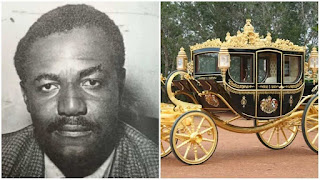Meet Nigeria’s first millionaire, who sent is clothes abroad for laundry
There is a popular Yoruba parlance when translated it means spending money like Da Rocha.In another Yoruba parlance when people are lured to spend too much money they will tell you that do you think I am like Da Rocha? Or they tell you I am not Da Rocha.
eagleee.com brings you the story of the legendary rich man, Candido Da Rocha.
Candido Da Rocha was a very wealthy Lagosian. It is also popularly believed that he was the first known millionaire in Nigeria.
Da Rocha as he was fondly referred to was born in 1860 as the son of Joao Esan Da Rocha, a former slave who returned from Brazil to start a business empire.
The junior Da Rocha, Candido, was reported to have just the language skills of Portuguese and Ilesha on his return. He attended the popular CMS Grammar School in Lagos where he was the head boy. He was a friend to late Herbert Macaulay who was also his school mate.
Da Rocha's Water Business
Candido was said to have laid water pipes from Iju to Lagos Island, Yaba Ebute Metta and other areas where there were high demand of pipe borne water. He was said to have lived in his house and operated the Iju water works.that served the whole of Lagos in the 20s. The colonial administrators were said to be paying Da Rocha for the supply of water to Lagos state. His house had the first bore hole and also the first water fountain. He was said to have sold water to the people from his house.
He made fortune from his water business such that he bcame very rich that the government had to take it over from him. His other business includes money lending which he did with two other rich men, J H Doherty and Sedu Williams and together that started a bank named the Lagos Native bank. He also went into fishery business and also opened a restaurant.
How Candido Da Rocha Became a Billion Through Gold Business:
In what was to eventually mark the beginning of his fortunes, an English gold prospector who wanted to travel back to England approached Da Rocha one in 1894 with bars of gold that he had mined and wanted to dispose of.
But there was a problem of funds as he did not have all the money required to buy the goods. The Englishman wanted 6,000 pounds. So, Candido da Rocha approached the Bank of West-Africa now known as First Bank. The bank lent Candido the required money with which he purchased the purchase of the gold bars.
He was later to file the gold bars into gold dust and sold on retail to the local gold smiths. He was said to have made on a whopping 200% profit on the sales.
Candido Da Rocha Founded Lagos Native Bank :
Candido Da Rocha went into the banking business and was the first African to own a bank called Lagos Native Bank which was established in 1907. He he joined hands with two businessmen, J H Doherty and Sedu Williams, to establish the Lagos Native Bank but ran the bank himself.
Family life:
Research revealed that Candido da Rocha lived alone most of his adult life and was never formally married to any woman whether traditionally, in court or in the church despite being a strong Catholic. He was said to be a difficult man to live with.
Three women were known to have had children for him and lived with him briefly.
One of the women was originally from the old Gold Coast now Ghana who had his first child and only son called Alexander Candido da Rocha. The second woman who had a son for him died at an early age. Thereafter, he had four daughters; three of these were born by the same woman and one daughter, Mrs. Enitan Salako, from another woman.
The daughters, three in all include Louissa Ebun Turton, the second daughter was called Angelica Folashade who later became Mrs. Thomas.
Candido da Rocha's Generosity :
Describing Da Rocha’s generosity, his 90-year-old granddaughter said, “People would come to him, crying, requesting financial assistance; from the balcony, asking how much they needed, he would throw down the money to them.
Candido Esan Da Rocha died in 1959 and is buried at Ikoyi Cemetery.
Though there was no Limousine nor Royce Rolls, Da rocha was said to have moved around in his luxury horse drawn carriage.
One of the grand daughters of Candido Da Rocha Angelica Oyediran in an interview with The Punch said of the wealth of her grandfather:
“Candido Da Rocha was quite close to the British and the western world then. He was highly respected and highly disciplined. He didn’t like dishonesty and lying. I stayed with him in this house for about three years when my mother moved in here to look after him. I was very close to him. He loved me and I was very fond of him. I learnt a lot from him. During the Second World War, Da Rocha offered one of his properties, Bonanza Hotel, to the British government to protect some Nigerian students at King’s College, who were initially in a boarding house at Race Course.
The school was run there until the war was over. Among his close friends was Herbert Macaulay. Da Rocha refused to be a politician. When he was nominated to contest an election and people approached him requesting money to support his electioneering, he said, ‘If you want Da Rocha you vote for him, and if you want Da Rocha’s money don’t vote for me.’ Twice, when Macaulay was arrested by the British colonial government for speaking out against them, Da Rocha paid (a fine) on his behalf to prevent Macaulay from going to jail and warned that he would not come to his rescue the third time. Da Rocha was a staunch catholic. He respected God. He was very rich – he was a millionaire in those days and very generous. The elite in those days sent their dirty clothes to Britain for laundry. The Da Rochas, Johnsons, Dohertys and the Olowus, were foremost wealthy people. They didn’t wash their clothes in Nigeria. They sent them abroad for laundry. Some of them had about five dozens shirts, five dozens vests, five dozens pants, and everything they could afford.”
Candido Da Rocha did not stumbled on money, neither did he stole people’s commonwealth before he became stupendously rich. His wealth could be traced to his father Joao Esan Da Rocha.
Joao Esan Da Rocha who was from Ilesha was captured as a slave at the age of 10 and taken away to Brazil in 1840. Joao Esan later got married to Angelica Josephina Da Rocha while in Brazil. The couple gave birth to Candido while still in Brazil.
In 1871, Esan alongside other slaves regained their freedom and a lot of slaves were able to trace their roots back the Yoruba tribe. On his return from Brazil, Esan Da Rocha was one of the returnees that approached the then Queen Victoria’s representative in Lagos to request a place for their resettlement in Lagos and they were apportioned the areas between the Central Bank of Nigeria on Broad Street up to Kam Salem, at Obalende.
The Water House was built by Esan Da Rocha on the land apportioned to him. He was given two portions of land because he came back with his wife of Nigerian origin and four children so he also got a portion of land on Tinubu Street. While building his own house, Esan built it as a replica of the house he lived in Brazil.
His houses are the famous Water House at Kakawa Street and the other one is on 4, Tinubu Street both on Lagos Island. Esan died at the age of 88 and was buried at Ikoyi Cemetery.
Candido da Rocha stepped into his father’s business empire, which he later expanded and consolidated into a multi-million pound financial empire, straddling agriculture, hotel, trading, real estate, banking and financial investment.
- Get link
- X
- Other Apps




